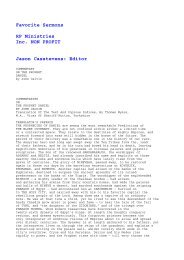Lamentations - The Sermon Depository
Lamentations - The Sermon Depository
Lamentations - The Sermon Depository
Create successful ePaper yourself
Turn your PDF publications into a flip-book with our unique Google optimized e-Paper software.
etc.; as though he had said, that however enemies might exceed moderation,<br />
yet if the people attended to God there was a just cause why they should<br />
humble themselves.<br />
He says, first, that Jehovah had done what he had determined: for the<br />
word to think is improperly applied to God, but yet it is often done, as we<br />
have before seen. He then says, that he had fulfilled the word which he had<br />
formerly commanded; for had the Prophet touched only on the secret<br />
counsel of God, the Jews might have been in doubt as to what it was. And<br />
certainly, as our minds cannot penetrate into that deep abyss, in vain<br />
would he have spoken of the hidden judgments of God. It was therefore<br />
necessary to come down to the doctrine, by which God, as far as :it is<br />
expedient, manifests to us what would otherwise be not only hidden, but<br />
also incomprehensible; for were we to inquire into God’s judgments, we<br />
should sink into the deep. But when we direct our minds to what God has<br />
taught us, we find that he reveals to us whatever is necessary to be known;<br />
and though even by his word, we cannot perfectly know his hidden<br />
judgments. yet we may know them in part, and as I have said, as far as it is<br />
expedient for us. This, then, is the reason why the Prophet, after having<br />
spoken of God’s counsels and decrees, adds the word.<br />
Let us then hold to this rule, even to seek from the Law and the Prophets,<br />
and the Gospel, whatever we desire to know respecting the secret<br />
judgments of God; for, were we to turn aside, even in the smallest degree,<br />
from what is taught us, the immensity of God’s glory would immediately<br />
swallow up all our thoughts; and experience sufficiently teaches us, that<br />
nothing is more dangerous and even fatal than to allow ourselves more<br />
liberty in this respect than what behooves us. Let us then learn to bridle all<br />
curiosity when we speak of God’s secret judgments, and instantly to<br />
direct our minds to the word itself, that they may be in a manner enclosed<br />
there. Moreover, the Prophet was also able, in this manner, more easily to<br />
check whatever the Jews might have been otherwise ready to object: for<br />
we know that they were always wont to murmur, and that as soon as the<br />
prophets spake, they brought forward many exceptions, by which they<br />
attempted to confute their doctrine.<br />
As, then, they were an unteachable people, Jeremiah did not only speak of<br />
God’s hidden judgments, of which some doubt might have been alleged;<br />
but, in order to cut off every occasion for disputes and contentions, he<br />
mentioned the word itself; and thus he held the Jews as it were convicted;<br />
for, as it is said by Moses, they could not have objected and said,<br />
“Who shall ascend into heaven? who shall descend into the deep?<br />
who shall pass over the sea?” (Deuteronomy 30:12-14;)<br />
for in their mouth was God’s word, that is, God had sufficiently made<br />
known his judgments, so that they could not complain of obscurity. We<br />
now then perceive another reason why the Prophet joined the word to<br />
God’s judgments and decrees or counsel.<br />
But he says that this word had been published from ancient days; and here<br />
he touches on the untameable obstinacy of the people; for had they been<br />
admonished a few days or a short time before, they might have<br />
expostulated with God; and there might have been some specious<br />
appearance that God had as it were made too great haste in his rigor. But<br />
as prophets had been sent, one after another, and as he had not ceased for<br />
many years, nay, for many ages, to exhort them to repentance, and to<br />
threaten them also that they might repent, hence their inveterate impiety<br />
more fully betrayed itself. This is the reason why the Prophet now<br />
mentions the ancient days, in which God had published his word.<br />
He at length adds, he hath subverted and not spared. He does not here<br />
charge God with too much rigor, but rather he reproves the Jews, so that<br />
from the grievousness of their punishment they might know how<br />
intolerable had been their iniquity. He would then have them to judge of<br />
their sins by their punishment, for God does not act unjustly towards<br />
men. It hence follows, that when we are severely afflicted by his hand, it is<br />
a proof that we have been very wicked.<br />
He then concludes that it was God who had exhilarated their enemies, and



